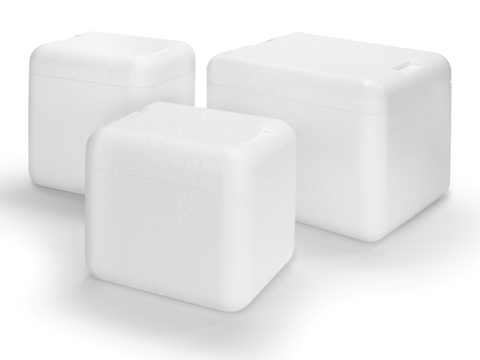
Labelmaster’s DGeo packaging division and Altor Solutions subsidiary Lifoam Industries have applied a biobased additive to temperature-controlled expanded polystyrene impact packaging, which is then thought to biodegrade by 92% in a four-year span without leaching microplastics.
Traditionally, the EPS foam used in coolers or utilized as impact barriers is not biodegradable and, according to DGeo, takes hundreds of years to break down.
In response, BioEPS packaging aspires to replicate the features of traditional EPS products – including temperature control, void fill, and impact protection – and prevent any impact on convenience or performance in storage or transit, all while offering biodegradability at end-of-life.
Using a biobased additive, BioEPS is believed to break down by an average of 92% in a bioreactive landfill within the space of four years, all without leaving microplastics behind. It is also said to be recyclable wherever EPS is accepted without requiring sorting or separation.
DGeo recommends the solution as a ‘simple’ and ‘tangible’ way for companies to pursue their sustainability goals. Potential customers can request trials and testing to gauge BioEPS’ suitability for individual operations.
Custom applications, proprietary designs, and replacements for existing EPS products are also available, the company emphasizes.
“The tens of millions of traditional EPS foam products used annually are not sustainable and conflict with many green initiatives,” explained John Glaser, director of packaging development at DGeo. “Adding BioEPS packaging to our product portfolio allows us to provide an environmentally-friendly replacement to traditional EPS that delivers the same quality and function for a comparable price.”
Scott Dyvig, senior director, new business development at Lifoam, added: “EPS has been a mainstay in cold chain and protective packaging for many years due to its high performance in thermal and physical applications and proven to be a challenge to replace, even in the face of a heightened scientific and cultural awareness around its environmental impact. By utilizing BioEPS packaging, companies and consumers can get all the benefits of traditional EPS with a better end-of-life story.”
In another sustainability initiative, The Home Depot previously announced its intent to replace all EPS and PVC in its private-brand product packaging. It claims to have cut approximately 6 million cubic feet of EPS from its operations so far, and plans to reach 100% compostable, recycled, or recyclable fibre packaging by the fiscal year 2027.
On the other hand, Lidl will soon sell yoghurt cups made of mechanically recycled polystyrene thanks to INEOS Styrolution’s “super clean” purification process. This is expected to generate food-grade recyclate and unlock a ‘significantly lower’ carbon footprint than that of a conventional polystyrene cup.
Other temperature-controlled solutions targeting enhanced sustainability are SeaCube’s Green and Net-Zero Reefer Leases, or refrigerated containers powered by Greensee’s AI-driven CO2 emissions reporting technology. The company is also collaborating with Thermo King and CMA CGM to test the E-COOLPAC electric genset, which is described as one of the first battery-powered refrigerated container gensets in the U.S.
If you liked this story, you might also enjoy:
The ultimate guide to the Packaging and Packaging Waste Regulation in 2024
How are the top brands progressing on packaging sustainability?
Sustainable Innovation Report 2024: Current trends and future priorities
Everything you need to know about global plastic sustainability regulation














No comments yet